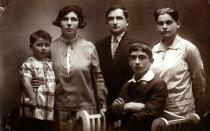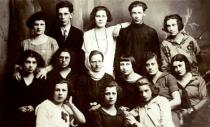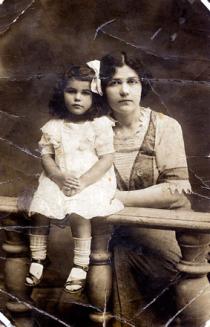This is a photo of my elder sister Zlatka. I think, it was taken late in 1930s, before her emigration to Austria.
My elder sister was born in 1909 in Volodymir, she was called Sara Zlata, we called her Zlatka. She moved to Warsaw to study when she was 16. She studied Polish history at the Warsaw University. She already had communist sympathies back then. She spent a year in prison for some political affairs. With a sentence like this she was unable to find a work as a teacher. She gave private lessons, she was a very good math tutor. She earned so well on tuition that she was even able to help Mom a little. My Father's political views differed from my sister's but I got the impression he was nevertheless proud of her in a way. It might have something to do with the fact people were not so hostile towards the communists before the war as they are now, communists and socialists were thought to be people fighting for their ideals. Father was generally on better terms with Zlatka than with me and Hilka. Maybe it was because he was younger when she was young, I don't know.
Zlatka usually came home for the Pesakh holiday. They lasted eight days and supposedly she couldn't stay that long, so she would leave after four days. Father once asked her not to eat bread during the remaining days of the holiday. She was already a grownup and an atheist at the time, and she told him she didn't want to make him such promise since she wouldn't keep it. And he blurted out: 'In that case I won't send you the tuition money anymore.' In a fit of pique, she said: 'Alright then.' And from then on she wouldn't accept any money from him.
During my first year in Warsaw I stayed with Zlatka. Later she moved to Vienna to the man she loved, Srul Bursztyn, who worked there. I think it was in 1937 or 1938. It was an affection dating back to their school years. And anyway, we were friends with his whole family, they lived in Lublin, used to come to Skryhiczyn for the summer. He was a Communist, just like her. Right after she'd arrived there was the Anschluss and Hitler took over Vienna. At that time many Communists, with the help from various people, were somehow being transported to England. They were given money for the flight which they returned once they'd reached England. Anyhow, she went to England and someone helped her find a job as a maid. Some time later came her fiancé, who already held an engineering degree, and got a job at a factory. They got married just before the war, in 1939. I remember Mother getting the letter with the news of their wedding. She was happy her daughter got married.
Zlatka stayed in England for a couple more years after the war. We wrote letters to each other. She even came to see us. Her husband, Srul Bursztyn, didn't want to come back to Poland but she had him come. They returned for good in 1949 I think. They lived in Warsaw. They came with their son, Jerzyk, who was born in England. Later they had two more sons: Wlodek and Andrzej. Zlatka was an editor in a popular science publishing house. Her husband worked in the PKPG [Polish Committee on Economic Planning] as the head of the technology department.
Some time around 1956 my brother-in-law Srul Bursztyn went to see his parents, who were already in Israel. When he got back, his desk was taken. He was an ambitious man and he said 'no'. That's when the first official anti-Semitic actions took place, firing people. My brother-in-law was pushed aside. And later their son Jerzyk was riding on a bus and heard some remarks: 'What is this little Jew doing here?' or something to that effect, and no one at all stood up to take his side. He was 15 or 16, he jumped out of the moving bus and told his mother: 'I don't know about you, but I'm leaving.' And their youngest son came back home and said: 'I don't want to be a pretty little Jew', because someone in the street said to him: 'What a pretty little Jew.' He sensed the offense in that. And so my sister's husband and children made the decision. They left for Israel in 1956.
My brother-in-law got a job at Weizman's Institute, a large research center in Rehovot, outside Tel Aviv. They were given an apartment there. Very nice place, woods, flowers, laboratories right next to the housing. After my brother-in-law's death Zlata moved to Tel Aviv as her children wanted to have her closer. The boys changed their names in Israel to Hebrew ones, just like many people did. They're now called Igal, Michael, and Arie. Igal is a filmmaker, Michael - medicine professor, and Arie is a choreographer and dancer.
Zlatka died in Tel Aviv in 1999.

































